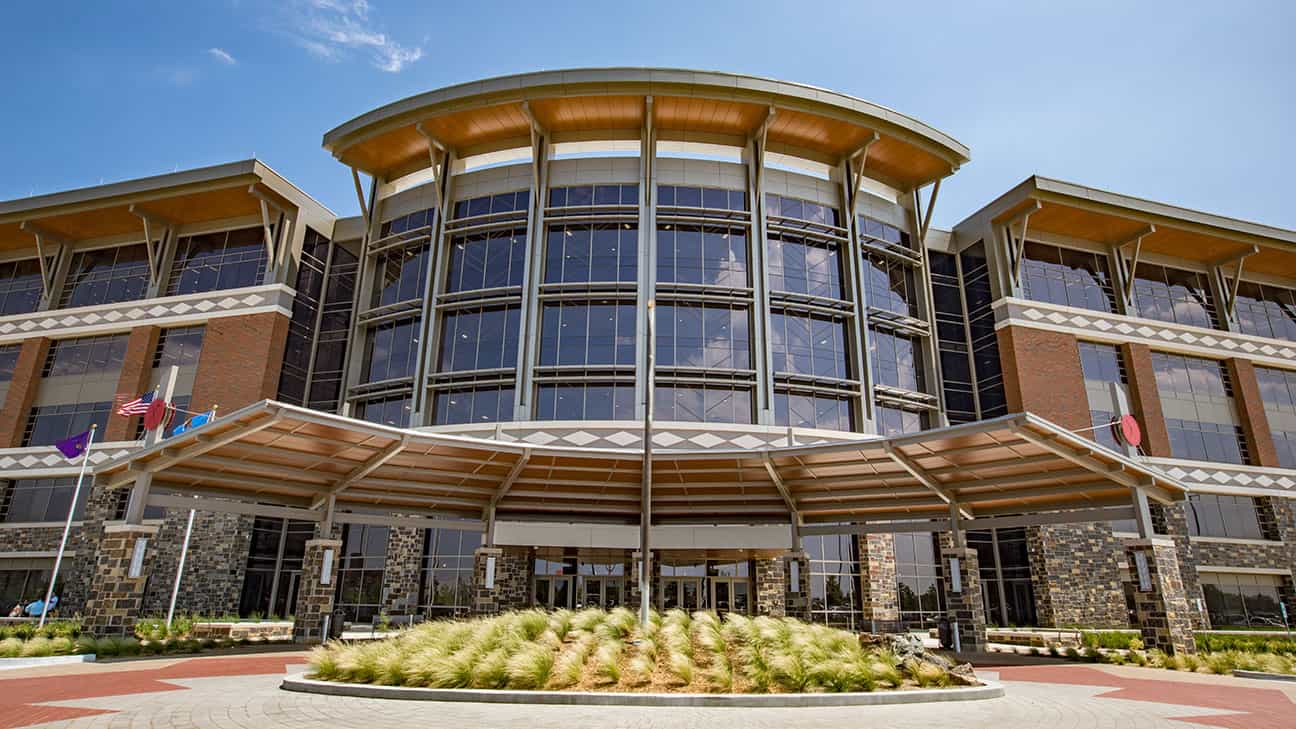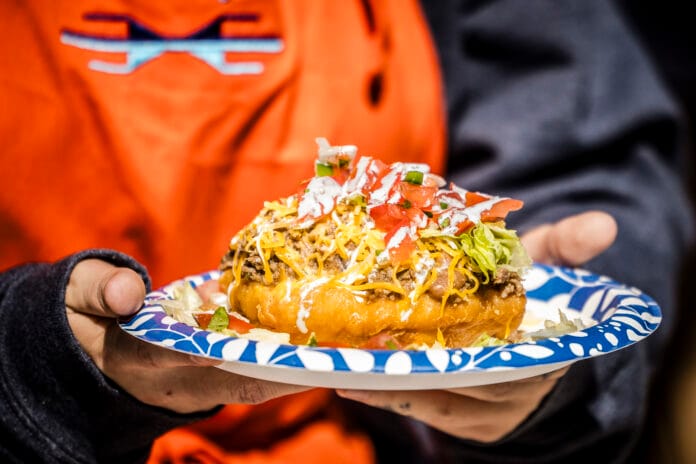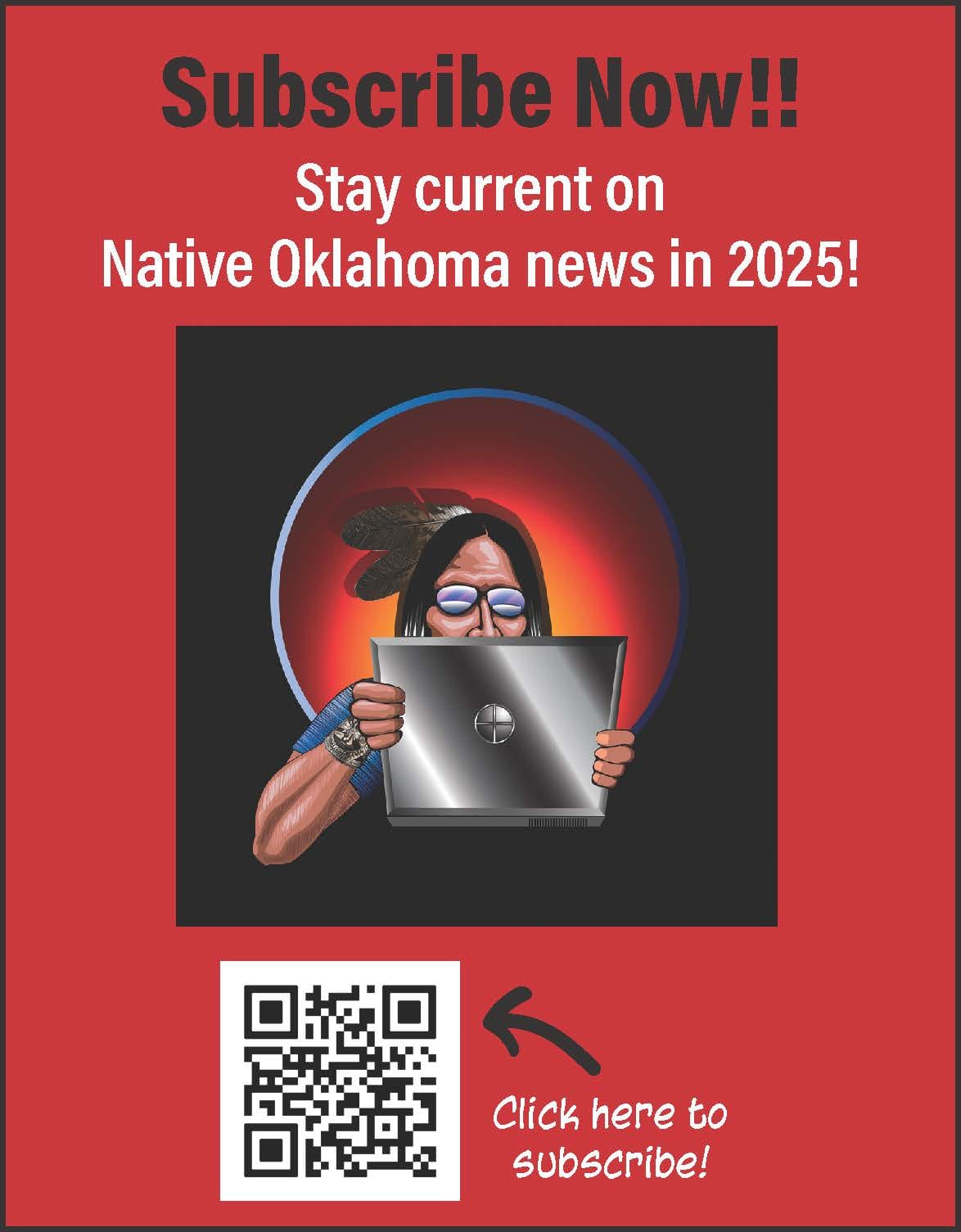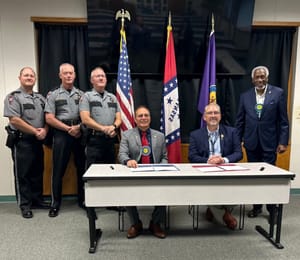

Food distribution bill has potential for growing Tribal agribusiness

Food Distribution Program on Indian Reservations Act could provide tribes with greater autonomy in distributing healthy, locally-sourced, traditional foods to citizens
by Braden Harper, Mvskoke Media
OKLAHOMA CITY – Soon Native American Tribes across the United States could have greater autonomy in the way their citizens are distributed food. House Bill 3956, or the Food Distribution Program on Indian Reservations (FDPIR) Act of 2025, will amend the 2018 Farm Bill by authorizing the Secretary of Agriculture to enter into self-determination contracts with Tribes. The bill modifies a FDPIR pilot program which is currently being utilized by 16 tribes including the Cherokee Nation and the Chickasaw Nation. Its goal is to provide greater access to healthy foods for Tribal communities.
FDPIR currently provides food to eligible families living on reservations and serves as an alternative to the Supplemental Nutrition Assistance Program (SNAP). According to the bill, Indian Entities, or Tribes and Tribal Organizations, can negotiate and enter into self-determination contracts or self-governance agreements. Tribes can purchase agricultural commodities under the food distribution program for their reservation and administer programs, functions, services or activities related to their food distribution operations.
Tribes will be able to select the foods received in food packages, including domestically-sourced foods and will be able to establish direct contracts with the vendors that produce them. Data on how the Cherokee Nation and the Chickasaw Nation have benefited from the program has been published online.
According to the USDA’s website, Tribally-procured foods the Cherokee Nation has distributed includes beef chuck roast and ground beef chubs. These were distributed for a total of 36 months and were purchased through the 1839 Cherokee Meat Company.
The Chickasaw Nation’s tribally-procured foods includes ground beef, roast beef, dry hominy, stew meat, and pecans. Their USDA supplanted foods also includes wild rice, canned beef, and peanuts. These were distributed over the course of 24-33 months. The foods were purchased through Rolland Ranch Beef, Guderian Foods,and the Bryant Pecan Company.
Although the Muscogee (Creek) Nation is not currently part of the pilot program, College of Muscogee Nation Extension Coordinator Chris Azbell believes the bill would be beneficial to the Nation’s food distribution network. Currently MCN does not source locally, that is done through the USDA. According to Azbell, if food distribution were to become locally sourced, it would need a diverse selection of producers.
“We can start sourcing food locally, we can start growing out our agribusiness system,” Azbell said. “We can identify producers that sign these contracts and we don’t have to go all the way in. We can continue to utilize USDA in some of their distribution points to provide us food, however over time we can start transitioning that to local food access.”
Bill Sponsors and Pilot Testimonies
The bill is cosponsored by Oklahoma Third District U.S. Representative Frank Lucas and Kansas Third District Representative Sharice Davids (Ho-Chunk). According to Rep. Lucas, the pilot program that is already currently in effect has yielded positive results.
“I am very pleased to join my colleague from Kansas to introduce legislation that will ensure we honor our trust and treaty obligations,” Lucas said. “Tribes should be able to self-contract to administer quality, domestically produced food. Through the USDA’s FDPIR Demonstration Project, the tribes have proven that they are willing and able to successfully administer this program – now it is time to expand access to all tribes.”
Rep. Davids believes that the bill will be effective in meeting the unique needs of tribal citizens living on reservations. Particularly for those who live in food deserts, or low-income communities that lack nearby access to stores that offer affordable, healthy foods.
“For many Native families, accessing healthy, affordable food isn’t as simple as driving to the nearest grocery store,” Davids said. “Tribal communities face unique barriers, including long distances to grocery stores and supply chain disruptions that delay or cancel food deliveries. This bipartisan bill helps break down those barriers by ensuring tribal governments can better serve their communities and ensure families don’t go hungry.”
Both Chickasaw Nation Governor Bill Anoatubby and Cherokee Nation Principal Chief Chuck Hoskin Jr. spoke highly of the pilot program at a House Committee on Natural Resources Oversight Field Hearing on April 4. According to Governor Anoatubby, the Chickasaw Nation has distributed USDA foods to its citizens for the past 40 years. The pilot program enhances those services by providing the tribe with greater autonomy.
“The program is excellent,” Governor Anoatubby said. “The addition of a self determination program where we can purchase certain foods ourselves is certainly something we welcomed and has proven to be a very good change.”
Chief Hoskin remarked that the program gives his citizens a sense of normalcy, no different than a consumer going out to purchase groceries at the supermarket.
“It’s a good program, it’s an effective program, we’ve used it to good ends,” Chief Hoskin said. “These food distribution programs are in our tribal lands grocery store experiences in which the dignity of the citizen is maintained where they are able to access food that they need. This is beneficial because it allows us to buy locally.”
Azbell believes that the bill is a good step in the right direction for the tribes, however it will take time to build the agribusiness economy, including MCN’s. Although the fruits from a permanent bill might not be harvested immediately, Azbell said the result is worth it.
“People in general have gotten away from ag. It now comes down to just a few producers in the United States,” Azbell said. “Building that back is going to take time. And a willingness for people to go back and reengage with ag. You know, roll up their sleeves and get dirty. There’s a lot of opportunities.”

Choctaw Nation Tribal Council Approves $2.6B Budget for FY 26

DURANT, Okla. – The Choctaw Nation Tribal Council on Sept. 13 unanimously approved a comprehensive expense budget of $2.6 billion for fiscal year 2026. This budget represents a 10.5% increase over the previous year.
“The Tribal Council has shown time and time again their commitment to tribal members,” Chief Gary Batton said. “Each year, through the council’s guidance and preparation, we continue to improve our services to the Chahta people.”
“We are honored every year to offer new opportunities to our tribal members,” Batton said. “This approved budget places a $600 million investment back into the reservation for more housing opportunities, healthcare expansion, education, Chahta language and cultural investments. Our goal is to provide opportunities for a brighter future for our people.”
Choctaw Nation of Oklahoma (CNO) tribal membership continues to grow and now stands at more than 230,000 individuals. To support the tribe’s increasing demands, CNO plans to hire an additional 115 employees in fiscal year 2026, bringing the total number of associates to 13,600.
The new fiscal year begins Oct. 1, 2025.

Cherokee Nation pushes for tribal input within the FEMA Review Council

WASHINGTON – Tribal leaders are concerned about the potential revamp of FEMA under an executive order from President Trump, which could include eliminating grants and slowing funding timelines, directly impacting the tribes' preparation for Oklahoma's historically destructive storms.
This comes just months after FEMA signed a significant agreement with the Cherokee Nation to help lead disaster response teams across the U.S—the first tribal nation to do so. The agreement recognized the Cherokee tribe as a partner and emphasized tribal sovereignty.
Former Mississippi Gov. Phil Bryant, who sits on the review council, said tribal leaders are being consulted about the continued existence of FEMA.
“The Native American leadership told us of the concerns they had, but also offered their help and support,” Bryant said. “It was amazing to me to see the leaders of the tribes that were saying, ‘Don't just call on us in times of tragedy, call on us if someone else has a tragedy, call on us to help.’”
Cherokee Nation Deputy Principal Chief Bryan Warner supported Bryant’s statements but expressed concerns about the council’s makeup.
“Tribal representatives shared a common concern: the lack of a tribal delegate on the review board. We have enjoyed a successful partnership with FEMA for many years, but collaboration requires tribal voices to be involved at the decision-making level,” said Warner.
Oklahoma Gov. Kevin Stitt announced his support for a plan to revamp the Federal Emergency Management Agency, the federal relief agency dedicated to disaster management, during a FEMA Council Review meeting held in August in Oklahoma City.
During the meeting, Stitt endorsed handing more power to the states and handling relief efforts through flexible block grants to replace the current FEMA structure, with federal support present in the event of an extreme disaster.
“Topics included the pace of grant timelines and the possibility of eliminating infrastructure grants, which are critical to helping the communities across the Cherokee Nation Reservation prepare for emergencies,” said Warner.
The August meeting was the third for the council, with Stitt serving as a panel guest. No tribal leaders were included among the speakers despite 39 tribes being located in the state. Oklahoma has a long history of severe weather, most notably the 2013 Moore tornado, which caused $2 billion in damage. Although tornadoes are the most infamous of Oklahoma’s disasters, the state also experiences frequent wildfires, hailstorms, droughts and flooding.
Stitt also suggested raising the threshold that triggers federal relief funding. He said the current $7.45 million threshold for Oklahoma could be increased to $30 million for the state. The governor did not say what size block grant the state would need.
If the relief trigger were to rise, it could make it harder for tribes to receive federal emergency funding, as many might not reach that threshold, even during a major disaster. With the proposal of primary state relief, the implementation of block grants would risk the tribes being overlooked.
Previous meetings of the FEMA Review Council laid the groundwork for a debate about the agency's future and raised concerns about disaster response time, especially in major cities; however, Native American stakeholders have become a more recent conversation.
Additional meetings have been scheduled with the tribes regarding the existence of FEMA.
The review council has not announced the next public meeting date. The council is expected to deliver its final report to Trump by November, in accordance with the executive order.
“Cherokee Nation will participate to ensure our perspectives are heard. The tribe’s current Memorandum of Understanding with FEMA underscores a history of cooperation, and we look forward to continuing this work to serve our people and neighbors in northeast Oklahoma,” said Warner.
Gaylord News is a reporting project of the University of Oklahoma Gaylord College of Journalism and Mass Communication. For more stories by Gaylord News go to GaylordNews.net.
Indian Taco Championship returns to Pawhuska for 21st year

Annual event set for Oct. 4 with 20 contestant spots, vendors, powwow, and cash prizes
Written by Benny Polacca, Osage News
The National Indian Taco Championship is returning to downtown Pawhuska for its 21st year on Saturday, Oct. 4, for a day of food, fellowship, and entertainment featuring Indian tacos.
Each year, the annual cooking competition and food sale event draws hundreds of people to Pawhuska, featuring Indian taco cooks and their helpers from various tribal and culinary backgrounds who compete for cash prizes awarded to the top winners. The Pawhuska Chamber of Commerce hosts the event, with sponsorship coming from local businesses and entities.
“We’re now accepting sponsors, vendors, and contestants — but heads up! We’re limiting this year’s taco competition to 20 contestants, and spots are available on a first-come, first-served basis,” The Chamber wrote on the NITC Facebook page.
“We have 11 registered contestants so far, and around 20 for non-food vendors. We do still have space available,” said Reba Bueno-Conner, who is office manager for the Chamber of Commerce. “The last day to sign up is Sept. 15.”
Contestant food booths will price their own Indian taco dishes and other food items for sale. There will be drink vendors as well and the event also features a contest powwow with cash prizes.
The day-long event will begin at 10 a.m. and will last through 4 p.m. or earlier if the food vendors sell out of their dishes.
This year, the Nation’s Foundation is one of the event sponsors along with local businesses. “The Osage Nation Foundation is a non-profit organization dedicated to promoting the continued development of the Osage Reservation and the surrounding communities influenced by the Osage Nation,” the event page reads.
For more information or questions about the NITC, call the Pawhuska Chamber of Commerce at (918) 287-1208 or email Reba@pawhuskachamber.com.
Follow the “National Indian Taco Championship – Pawhuska” on Facebook for any further updates.








